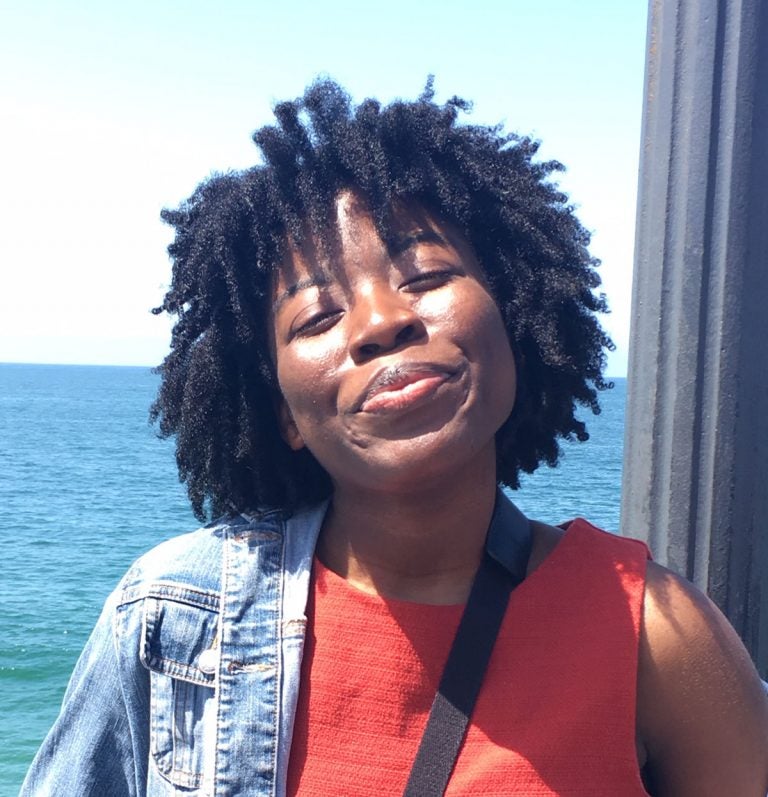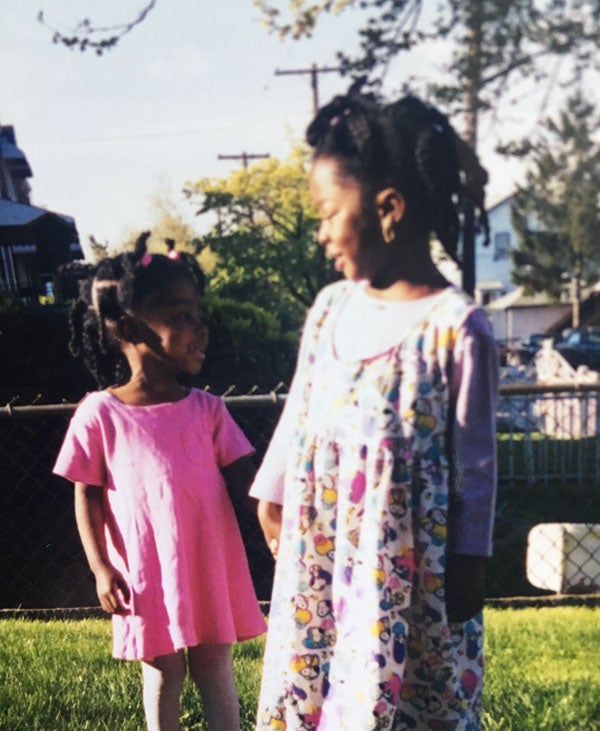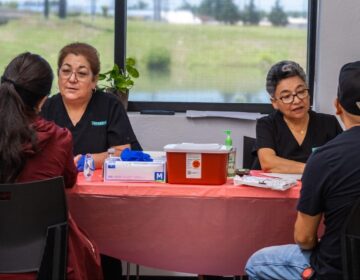How long can my kinky natural hair grow? To be length-obsessed and black
Long natural hair elicits wonder — but also much wondering about how to achieve it, and how to stop comparing ourselves with others who have.
Listen 07:19
Reporter Mycah Hazel is a self-described "lifelong, kinky-haired natural." (Image courtest of Mycah Hazel)
This story is from The Pulse, a weekly health and science podcast.
Subscribe on Apple Podcasts, Spotify or wherever you get your podcasts.
In the black community, long natural hair evokes marvel. For decades and from as young as elementary school, many black women have used relaxers, powerful chemical treatments that straighten curly hair. Since relaxers can cause damage to natural hair, such as breakage or stunted hair growth, long natural hair is seen as a rarity.
Exactly how long our natural hair can grow and how long it takes to grow is a mystery to many black women. Still, one way to get answers to just not relax your hair. This is how I’ve lived, as a lifelong, kinky-haired natural.
Growing up in the early 2000s, my mom, Michel, had a strict rule: No relaxers would ever enter our Brooklyn, New York, home. Rather than ship me and my sister to the hair salon, she spent four hours washing and combing our hair every Sunday night until we turned 18.
“Since you guys were toddlers, uppermost in my mind was making sure that you liked yourselves naturally,” my mom said.
She was my stylist, rotating between twists, braids and buns. She was also my cheerleader, making sure I knew that even though my hair wasn’t wavy like Hilary Duff’s or had cool highlights like Lindsay Lohan’s, it was still gorgeous.
“When I was doing your hair, I would always be making these comments of how black your hair was or how healthy it looked and, you know, how it felt,” my mom said. “I always talked about it in a positive way so, like, giving you the joy of your own hair.”

Not having relaxed hair did get lonely sometimes. From elementary school to high school, I was often one of only two girls in my class with natural hair. Still, being alone had its advantages. Since nobody looked like me, I didn’t worry about how long my hair was or how it compared to other girls’. My mom was supportive of my hair and in public, people were in awe of it.
“People made a lot of comments when you were preteens and teens about your hair,” my mom said. “One of the things they would always say is, ‘Oh, your hair looks so beautiful. Don’t you ever perm it.’ Or things like that. ‘I’m glad you never permed it. It looks so good natural. Keep it like that!’”
When college came, I moved to upstate New York, and I brought my mother’s Sunday wash routine with me. It consists of seven steps:
• Detangle the hair with a wide-tooth comb and lotion
• Shampoo
• Condition
• Apply a hair mask to add moisture
• Wash out the hair mask
• Add a leave-in conditioner and a heat protectant
• Blow dry
But washing is the easy part. For kinkier hair like mine, washing but not styling hair can lead to it getting matted and dry overnight. It has to be styled in braids or twists. This was something I didn’t prepare for before college. So, as in most situations, I turned to the internet. I found a ton of hairstyling videos.
But I also found another type of video: length checks.
Length-check videos were made by women who had cut off their relaxed hair and were tracking their natural hair growth. They’d tug a strand of their natural hair down and mark where it reached — nose-length, shoulder-length, or the goal, waist-length.
Subscribe to The Pulse
I fell down a rabbit hole of length-check videos. It was addicting, watching how long, thick and luscious these women’s hair had become. Some women’s hair grew as quickly as 4 inches in six months. Other women’s hair had grown waist-length in a single year.
Still, the more videos I watched the more nervous I became. These were girls who had just gone natural. How was their hair growing faster than mine?
Naturally, I became length-obsessed.
Any natural-hair YouTube channel I visited, I would scroll through their videos to see how quickly their hair had grown. I became super bummed about my own hair.
It didn’t help that going from relaxed hair to natural hair was becoming popular offline too. It seemed like every woman on campus was starting their natural hair journey, and that their hair was growing faster than mine. Talking to friends, I would be distracted by their growing top buns and thick Afros.
However, I wasn’t alone. In the comments sections on YouTube, I found that black women from across the hair spectrum were also confused about why their hair grew so slowly compared to the women in these videos.
Sabine Bellevue, owner of Sabine’s Hallway, a natural hair salon in Brooklyn, helped to clear up some of the confusion.
“We have a false idea of what our hair should look like because of what we see [with] someone else’s hair,” Bellevue said. “You have to understand, they live in a different climate than you. Their diet is different than you. Depending on where they live and what they do, and their lifestyles is not like yours, and their parents are not your parents. So your hair may not look like theirs and is not going to come out the same way that their hair is.”
Just because we don’t see the same results as the women in these videos doesn’t mean our hair doesn’t grow. Kogie Porter, owner of Jenetics Hair Salon in Bronx, New York, and a certified trichologist, or hair doctor, said hair grows a half-inch per month.
“There is growth that we are not seeing,” Porter said, who has been doing hair for more than 30 years. “Our hair grows out either in a tight C or a tight S pattern. You won’t see it unless you straighten it out completely. If we begin to take that natural hair and pull it, you will see length.”
Climate, genes and diet can tell us why some black hair is longer than others. What is more complicated is why length matters so much to us as black women.
New York-based psychologist Linzy Andre linked it to something called residual trauma: Our black ancestors had it ingrained in them that European features such as long hair were preferable, so we subconsciously are concerned when we don’t have them.
“There are so many factors that have been used to separate us or to place us on some type of hierarchy,” Andre said. “Everything from skin tone to hair texture and length, to body type and curves. This is something that our parents and grandparents and people way into the past have been dealing with. And it’s not just going to go away.”
Our obsession with hair length as black women is rooted in a history way bigger than YouTube. But steps to get rid of this obsession are smaller.
“My No. 1 piece of advice is just learn to appreciate who you are and how you are,” Andre said. “As cliche as it sounds, I think that’s something that sort of needs to be repeated and understood over and over again.”
Instead of drooling over bloggers on YouTube, maybe I should be listening to what my mom’s been trying to get through to me for years.
“You’re not a child anymore,” she said. “You’re independent. And I’m seeing that you’ve grown to love yourself. So my role now is just to support, encourage, just to be there.”
My mom may not have to do my hair anymore, but I can always use her encouragement.
WHYY is your source for fact-based, in-depth journalism and information. As a nonprofit organization, we rely on financial support from readers like you. Please give today.






